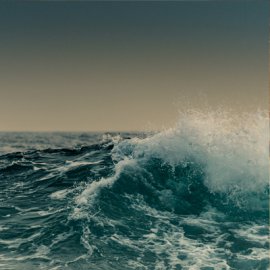Hurricane Ian
-
English
-
ListenPause
[intro music] Welcome to World Ocean Radio… I’m Peter Neill, Director of the World Ocean Observatory. Hurricane. Extreme weather. Typhoons reported in the east, hurricanes in the west, given names, as if they are old friends, not seen for too long a time, but returning into our lives with a vengeance. Once such recently was Ian. Born in the Caribbean, Ian showed a predictable direction, followed by the meteorological apparat, anxious announcers proclaiming force and direction. These storms, in increasing frequency and strength, are the exclamation points of climate change, along with drought and wildfire, every day more prevalent in our forecasts increasing evidence of the reality of global climate change, every day, every time, undeniable. Ian hit Cuba, but proved eccentric, changed course, away from the east coast of Florida and the Atlantic coast, veering to the Keys, then further west up the opposite coast to make landfall near Orlando. There was ample warning. Evacuation plans were in place and called for. After the fact, some claim these orders were not soon enough, not enforced enough; some residents were deniers ignored the fact, thus the impact, thus the consequence, and did not fare will. The post- hurricane aerial photographs show the reality: an evacuation, not of people, but of entire neighborhoods, houses gone, vehicle asunder, palm trees shredded, roads inundated, beaches washed away, sending all the sand, fast food wrappers, and discarded plastic off to Mexico. That photograph is a dramatic, sad selfie, captured in time, with the smiles and jokes and happy moments erased, leaving only the detritus of a place, a neighborhood of young families or retirees gone in the wind, in the sound, in the waves, as if they were never there. The ocean is both symbol and reality of time, of change, and one storm, one swath of destruction, one eviction of a community, means nothing in its passage. To those displaced, of course, it means everything. And they are left to re-invent their lives. The government will excuse and procrastinate; the insurance money will be too little too late; and the tide and sand will cover up the ruins—the drowned family rooms, the skateboards and beach toys, the family mementos and collections, the scrapbooks, the albums, the old love letters—and reclaim what was once for them the details of home. I look at those photographs and see cemeteries, an erosion of lives swept away, memories buried, futures forever changed. What is the price of denial? How is it measured? Estimated losses? Cost of restoration? Insurance claims? Government emergency relief? Lost wages? Cost of relocation? Political accountability for lack of leadership and preparation? Who pays? In truth, we all pay. And the time to redress and meet the climate challenge may soon be gone. Governments and corporations are reneging on their climate pledges. The hypocrisy of best intentions by market-fearing investment banks, short-term financial managers, campaigning politicians, and dithering bureaucrats is revealed by Ian’s destruction. Disneyland was closed. The causeway to Sanibel Island was destroyed. The death toll mounts. Some are still unaccounted for. Will everything re-open, “business as usual?” Who will accept responsibility for this disaster? Ian was not finished. He wandered east into the Carolinas, then north, bringing torrential rain all the way to New England and the Canadian Maritimes. He was not to be denied. The 2022 hurricane season is not over. Two new cells incubate, the next one will be named Julia. The UN Secretary General António Guterres issued a statement this week: “Global and national climate commitments are falling painfully short,” he said, “We are headed for global catastrophe.” Who cares? What will it take? We will discuss these issues, and more, on future editions of World Ocean Radio. [outro music]
This week on World Ocean Radio we're discussing the harsh realities of 21st century storms in the face of climate change: hurricanes more powerful, more destructive, and more impactful on our ways of life. And we're asking, what will we pay if we continue to deny the realities of our climate challenges, and when will we accept responsibility for such disasters now and into the future?
About World Ocean Radio
5-minute weekly insights dive into ocean science, advocacy and education hosted by Peter Neill, lifelong ocean advocate and maritime expert. Episodes offer perspectives on global ocean issues and viable solutions, and celebrate exemplary projects. Available for syndicated use at no cost by college and community radio stations worldwide.
Image
Mario Caruso on Unsplash
- Login to post comments



